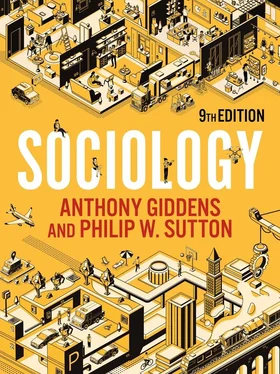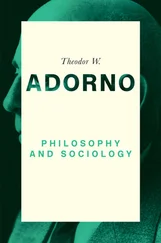On this argument, it is also wrong to see fullblown globalization as inevitable or beyond the control of citizens and governments. In fact, globalization is a dynamic, open process that is subject to many influences and is constantly changing. On this view, globalization proceeds in an uneven and often contradictory fashion, encompassing tendencies that operate in opposition to each another (Randeria 2007). There is a two-way flow of images, information and influences from the global to the local, but also in the opposite direction. Global migration, international tourism, mass media and telecommunications contribute to the diffusion of widely varying cultural influences, and the world’s vibrant ‘global cities’, such as London, New York and Tokyo, are thoroughly multicultural, with ethnic groups and cultures intersecting, sharing and living side by side (Sassen 1991).
In summary, transformationalists view globalization as a decentred, reflexive process characterized by links and cultural flows that work in a multidirectional way. Because it is the outcome of numerous intertwined global networks, it is not driven by the USA (Americanization), ‘the West’ (Westernization) or any other part of the world (Held et al. 1999). Nor is globalization a new form of colonialism or imperialism, as the process is open to influence from every part of the world. However, Osterhammel and Petersson (2005) argue that we should use the term ‘globalization’ only when relations across the world have acquired ‘a certain degree of regularity and stability and where they affect more than tiny numbers of people.’ In the future, global networks and relationships must develop into global institutions if the process is to become more permanent and the dominant factor in shaping human affairs.
Globalization, regionalization or something else?
The 2008 global financial crisis brought home some of the risks inherent in an emerging ‘borderless economy’. In the European Union, huge economic bailouts of the Republic of Ireland, Cyprus, Greece and Portugal led to renewed questioning of the single currency and the logic of ‘ever closer union’. Is this an early sign that a gradual centrifugal tendency towards looser integration has begun to take hold in the EU? Have two major global crises of the twenty-first century – the 2008 financial crash and the 2019–20 pandemic – shown that citizens still turn to their own nation-states for solutions rather than relying on supranational bodies?
In many European countries there has been a backlash against increasing migration into Europe and the principle of freedom of movement within the EU. Recent years have seen the rise and electoral success of populist, nationalist parties in Hungary, Slovakia, Poland and the Czech Republic (Gosling 2019). In 2016, concern about large-scale immigration from EU countries was also a factor in the UK’s vote to leave the EU, as many voters favoured additional controls over the level and type of inward migration. The kind of borderless world forecast by hyberglobalizers is at odds with a continuing identification with ‘the nation’ and rising nationalist sentiment in politics.
Right-wing political movements and parties prioritize national identity over any benefits globalization may bring, but other political and social movements do not oppose globalization per se . During the 1990s, movements developed across the world that were highly critical of the capitalist free-market version of globalization but did not reject closer global connectedness. Rather, these movements promoted an alternative vision of what globalization could look like if ecological sustainability, human rights and community governance were at its heart. As a result, the varied groups and organizations – including the World Economic Forum – are known collectively as alter-globalization movements rather than being simply against globalization.

Populism and anti-/alter-globalization movements are discussed in chapter 20, ‘Politics, Government and Social Movements’.
Historically, globalization is the product of conflict, wars and invasions just as much as cooperation and mutual help, which means that reversals of global trends such as national economic protectionism are always possible. Conflicts have made a major contribution to globalization, but they also have the potential to send it into reverse. In the globalization debate, all three positions focus primarily on the contemporary process of rapid globalization and its consequences for the future. However, as we have noted, it is possible to set globalization processes into a much longer historical time frame. On this view, the extended development of human societies is leading towards more global patterns of interdependent relations, but this was not and still is not inevitable (Hopper 2007).

Chapter 21, ‘Nations, War and Terrorism’, contains an extended discussion of war and conflict.
Consequences of globalization
The main focus of sociology has conventionally been on the industrialized societies, with all other types of society being the province of anthropology. However, this academic division of labour has become less tenable as globalization proceeds. The Global South and Global North have long been interconnected, as the history of colonial expansion and empirebuilding demonstrates. People in the developed world depend on raw materials and manufactured products from developing countries, while the economic advancement of developing countries is enhanced by trading with the developed world. Globalization means the minority and majority ‘worlds’ are increasingly acknowledged as parts of one global human world.
As a result, the cultural map of the world also changes: networks of people span national borders and even continents, providing cultural connections between their birthplaces and adoptive countries (Appadurai 1986). Although there are between 5,000 and 6,000 languages spoken on the planet, around 98 per cent of these are used by just 10 per cent of the global population. A mere dozen languages have come to dominate the global language system, with more than 100 million speakers each: Arabic, Chinese, English, French, German, Hindi, Japanese, Malay, Portuguese, Russian, Spanish and Swahili. And just one language – English – has become ‘hypercentral’, as first choice for most second-language speakers. It is these ‘bilinguals’ who bind together the whole global language system that exists today (de Swaan 2001).
It is increasingly impossible for any society to exist in isolation from the rest of the human world, and there are few, if any, places left on Earth that are so remote as to escape radio, television, mobile phones, computers, air travel and the masses of tourists they bring. Today, people on every continent use tools made in China and other manufacturing centres, wear T-shirts and shorts manufactured in garment factories in the Dominican Republic or Guatemala, and take medicines manufactured in Germany or Switzerland to combat diseases contracted through contact with ‘outsiders’. Yet we are also able to broadcast our individual stories around the globe via social media and to view cultural products from around the world through satellite television. But does globalization favour the major producers, especially the USA, and thus lead inexorably to a uniform global culture?
Glocalization not globalization
The rapid growth of digital technology and internet access is an important aspect of globalization theories, potentially spreading ideas of equality, free speech, democratic participation and consumer culture. Moreover, digital communications seem to foster such an outcome: global communication, apparently unlimited and uncensored information, and instant gratification are all characteristics of the worldwide web. But could this lead to the erosion of differences and the global dominance of Western ideals and culture? Such a conclusion may be premature.
Читать дальше













